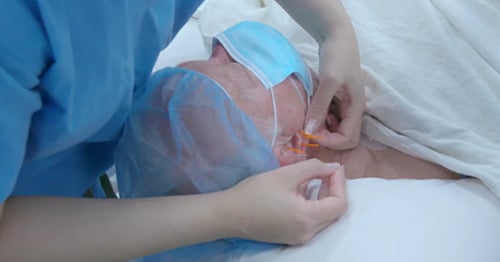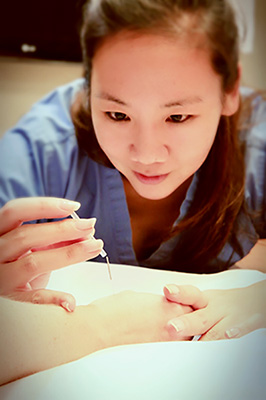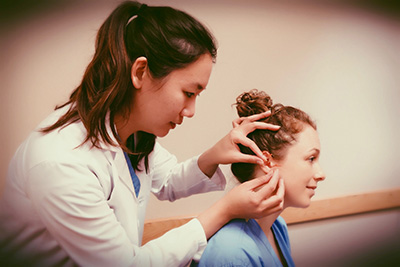Acupuncture for Orthopedic and Rheumatic Conditions
Acupuncture is an ancient form of healing in traditional Chinese medicine. Although the practice predates recorded history, evidence suggests that, beginning around 2,500 years ago, Chinese scholars developed modern acupuncture by defining a formalized system of pathways through the body, which were used to diagnosis and treat various conditions.

On this page:
What is acupuncture?
Acupuncture is a medical treatment involving the needling of specific points on the body surface to treat disease and to decrease pain. Acupuncture needles are very fine, solid, metallic needles. This ancient form of healing predates recorded history and is widely practiced throughout the world. The roots of modern-day acupuncture stem from ancient Chinese scholars who developed a system of pathways in the body called "meridians," for diagnosis and treatment points. This discipline is designed to rebalance the body’s “qi” (a life energy or vital force, sometimes also spelled “chi,” “ch’i” or “ki”) after disease or injury.
How does acupuncture work?
There are many theories of how acupuncture works. Classical theories are based on energy channels (meridians) that run throughout the body in specific paths. Pathologies (diseases and medical conditions) present themselves as disturbances within these channels that block the normal flow of qi. In acupuncture, special needles are used to stimulate the circulation and restore the natural energetics/flow of qi.
Modern theories of acupuncture suggest that the needles affect the nervous system, the circulatory system, the lymphatic system, and the electromagnetic quality of the interstitial fluid at the level of the fascia.

In classical acupuncture theory, the meridians are named after organs, but these should not be confused with the actual organ itself. For example, in acupuncture, the word “kidney” refers to the bones, marrow and joints, as well as to a person’s will and motivation. These pathways, or networks, interact with the internal and external environments and allow life force energy (the qi) to move throughout the body.
The growing body of modern theories of acupuncture indicates that the needle stimulation increases the natural release of endorphins within the body, which mitigates pain and promotes overall health by their affect on numerous systems in the body.
What is acupuncture used for?
Acupuncture can treat almost all organ systems in the body. However, in the United States, it is most widely used for musculoskeletal conditions, such as lower back pain and osteoarthritis. It may also be helpful in forms of inflammatory arthritis, such as rheumatoid arthritis, but should be used in conjunction with disease-modifying agents recommended by a rheumatologist.
Soft tissue wounds, muscle spasms, sprains and strains are among the acute musculoskeletal conditions that are most frequently and successfully addressed using acupuncture. Acupuncture is also appropriate to treat chronic musculoskeletal pain as part of a multimodal approach, such as repetitive strain disorders, myofascial pains, arthralgias (joint achiness), degenerative disc diseases and postoperative surgical pain. It is used as an adjuvant for traditional western medicines.
What happens during acupuncture treatment?
The acupuncture treatment itself consists of inserting fine needles into the body. The location of the needles depends on the disease pathology and is ultimately designed to influence the flow of qi throughout the body. The needles can be inserted directly, at the point of the injury or pathology, or they can be inserted at more distant points along the channels. There are also microsystems that exist in various parts of the body, such as in the ear or the hand, that have maps of the whole body contained in that small area. Needles can be placed in the spot that corresponds to the organ system affected, or in other specific points (for example,the Shen Men and Point Zero) which have global effects on the body that can help with, among other things, increasing overall endorphin levels.
How can acupuncture help during orthopedic surgery?
Acupuncture can be helpful before, during and after surgery for a number of reasons. Before surgery, it can increase your endorphin levels which can alleviate anticipated surgical pain, decrease anxiety, and enhance overall health. Because surgery is traumatic to the body, maximizing a person’s emotional and physical well-being is advantageous for a good post-surgical outcome. Additionally, acupuncture can also help with many other side effects of surgery, including postoperative nausea/vomiting, constipation, urinary retention, and headache.

Dr. Stephanie Cheng treating a patient using auricular acupuncture.
Video: Intraoperative acupuncture for low dose total knee replacement
Learn how HSS doctors are exploring the use of acupuncture during knee replacement to reduce the need for opioids after surgery.
What are the risks associated with acupuncture?
In the hands of those trained appropriately in the discipline of acupuncture, it is incredibly safe. The needles used are filiform and typically short, and therefore it is difficult cause any permanent problems. However, anytime there is penetration of a foreign object into the body there is a risk of infection, bleeding, needle retention, allergic reaction (especially to nickel, a metal used in most acupuncture needles), lightheadedness (needle shock) or organ injury. Some patients also report feeling fatigued, agitated, or tearful after their treatment.
It’s important to find a well-trained practitioner to maximize your treatment and minimize the side effects. Each U.S. state has its own requirements for practicing acupuncture. Research the requirements for your state and ensure that any practitioner you consult meets them. It is recommended that you talk with your primary care physician when evaluating acupuncture services.
In the news
- Three HSS Studies Presented at ESRA Annual Meeting Show that Ear Acupuncture During Hip Replacement Surgery Reduces Opioid Use
- Innovative Hospital: Hospital for Special Surgery
- How Acupuncture May Help Relieve Rheumatoid Arthritis Pain
- Acupuncture During a Knee Replacement Could Lessen Post-Surgical Pain
- Acupuncture reduces pain and opioid usage for total knee replacement surgery patients
- Yes, Acupuncture May Help Relieve Joint Pain and Aid Sleep
Acupuncture for Orthopedic and Rheumatic Conditions Success Stories
Medically reviewed by Stephanie Cheng, MD
References
- Cheng SI, Swamidoss CP, Soffin EM. Perioperative Acupuncture: A Novel and Necessary Addition to ERAS Pathways for Total Joint Arthroplasty. HSS J. 2024 Feb;20(1):122-125. doi: 10.1177/15563316231204308. Epub 2023 Oct 26. PMID: 38356751; PMCID: PMC10863582.
- Cheng SI, Kelleher DC, DeMeo D, Zhong H, Birch G, Ast MP. Intraoperative Acupuncture as Part of a Multimodal Analgesic Regimen to Reduce Opioid Usage After Total Knee Arthroplasty: A Prospective Cohort Trial. Med Acupunct. 2022 Feb 1;34(1):49-57. doi: 10.1089/acu.2021.0072. Epub 2022 Feb 14. PMID: 35251437; PMCID: PMC8886900.
- Cheng SI, Norman RM, DeMeo D, Zhong H, Turteltaub LH, McCarthy MM, Marx RG, Strickland SM, Kelly AM. The Feasibility of Blinding Intraoperative Electro-Auricular Acupuncture Under Neuraxial Anesthesia. Med Acupunct. 2021 Aug 1;33(4):286-294. doi: 10.1089/acu.2021.0003. Epub 2021 Aug 17. PMID: 34471447; PMCID: PMC8403191.
- Kelleher DC, Kirksey MA, Wu CL, Cheng SI. Integrating complementary medicine in the perioperative period: a simple, opioid-sparing addition to your multimodal analgesia strategy? Reg Anesth Pain Med. 2020 Jun;45(6):468-473. doi: 10.1136/rapm-2019-100947. Epub 2020 Mar 18. PMID: 32193284.
- Roberts JA 4th, Mandl LA. Complementary and Alternative Medicine Use in Psoriatic Arthritis Patients: a Review. Curr Rheumatol Rep. 2020 Sep 28;22(11):81. doi: 10.1007/s11926-020-00956-x. PMID: 32989481.
